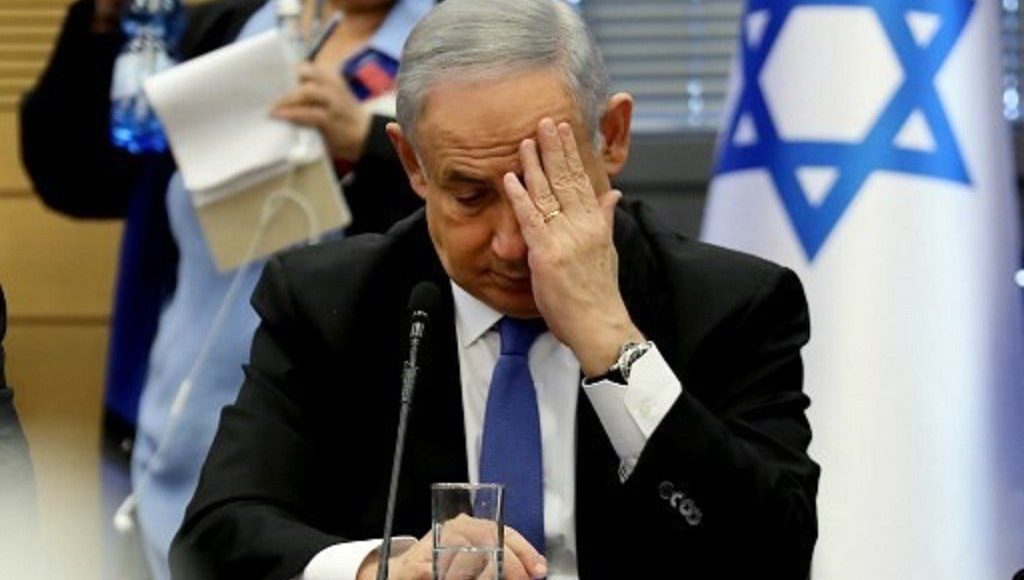“Israel’s” economy is dying; suffocating isolation pursues Netanyahu from Gaza to Bab al-Mandab and European Boycotts
OCCUPIED PALESTINE, Oct. 08 (YPA) – The Zionist entity’s government led by Benjamin Netanyahu is currently navigating its worst economic and political phases, as a European boycott begins to strike “Israel’s” exports and freeze multi-billion dollar trade agreements.
This is happening in parallel with the crippling of Israeli navigation in the Red Sea and Bab al-Mandeb due to Yemeni military operations supporting Gaza, which have effectively shut down the most crucial maritime lifeline to Asia and Africa.
The American magazine “Foreign Policy” revealed that Netanyahu admitted his government’s inability to confront the economic isolation, hinting at a shift towards a “self-sufficient economy.” Israeli experts, however, dismissed this as an “illusion,” emphasizing that “Israel” relies on foreign sources for over 90% of its food and industrial imports.
Meanwhile, the scale of the European boycott is broadening, extending from universities to ports and pension funds, amidst calls in Brussels to freeze the trade partnership agreement and impose additional tariffs on Israeli goods. This situation has driven sharp declines in the “Tel Aviv” markets in recent days.
The magazine noted that Netanyahu, who has often boasted of his ability to “fortify the Israeli economy,” was ultimately forced to acknowledge the reality of the isolation, stating, “We will have to adapt to an economy based on self-sufficiency, a word I strongly dislike.”
However, “Foreign Policy” described this proposal as “an admission of incapacity, not a rescue plan,” pointing out that “Israel” is not an industrial state capable of self-producing its needs, and that its major defense projects, such as “Arrow” and “David’s Sling,” depend on American and European partnerships and supplies.
As the Netanyahu government attempts to mitigate the effects of the escalating European academic and economic boycott, reports indicate that the European Commission is considering suspending parts of the trade partnership agreement with “Israel.” Such a move would impact about 37% of its exports to Europe and cost the entity losses exceeding billions of Euros annually.
Concurrently with the contraction of defense exports, the Zionist entity faces a graver challenge in the Red Sea, where Yemeni forces in Sanaa have imposed near-total restrictions on Israeli navigation in Bab al-Mandeb. This has severed a vital artery for the passage of commercial vessels and energy, deepening the economic isolation crisis.
“Foreign Policy” cited Israeli researcher Michael Milstein as stating that Netanyahu’s vision, dubbed “Israel Sparta,” is merely an isolationist trend that transforms the entity into a “besieged military state,” noting that most Israelis “do not want to live in a North Korea-like model.”
Manuel Trajtenberg, former executive director of the Institute for National Security Studies, warned that the economic isolation of “Israel” would lead to a “sharp drop in the standard of living and threaten the army’s ability to maintain its operational capabilities.”
Observers believe the current situation paints a picture of a three-dimensional siege: an escalating economic boycott, growing political isolation, and a de facto naval blockade due to the Yemeni operations. This places Netanyahu before the most serious test of his tenure, amidst the potential collapse of the ruling coalition and the eruption of an unprecedented internal crisis.
In light of these developments, Netanyahu appears to be facing the most severe economic challenge in the entity’s history, as “Israel” gradually transforms from a state reliant on trade openness into an entity enduring suffocating isolation on land, sea, and in politics.
YPA


